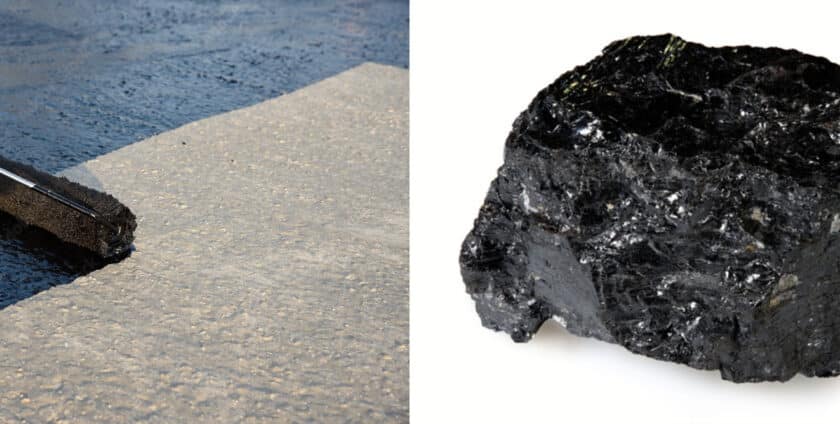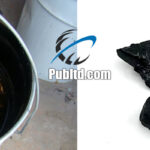
Difference between Bitumen and Gilsonite
Difference between bitumen and Gilsonite – In the world of construction and industrial applications, materials play a crucial role in determining the durability, efficiency, and overall quality of projects. Among the various substances utilized, Bitumen and Gilsonite stand out as essential components, each with unique properties and applications.
In this comprehensive guide, we dive into the differences between bitumen and Gilsonite, shedding light on their characteristics, uses, and the advantages they offer in different sectors.
What’s the Difference between bitumen and Gilsonite?
While both Gilsonite and bitumen are hydrocarbon materials used in industrial applications, they are chemically and physically distinct substances with different origins, processing methods, and performance characteristics.
🌡️ What is Bitumen?
Bitumen, also known as asphalt or tar, is a viscous, black, and sticky substance derived from crude oil distillation. It is one of the most commonly used materials in road construction, waterproofing, and industrial applications. Bitumen’s versatility stems from its excellent adhesive properties, weather resistance, and ability to bind various aggregates together, forming asphalt concrete.
-
A byproduct of crude oil refining.
-
Semi-solid or liquid at room temperature.
-
Requires distillation or modification for industrial use.
Bitumen Key applications include:
-
Road paving
-
Roofing membranes
-
Waterproofing
-
Damp-proofing applications
It’s valued for its adhesive properties, weather resistance, and affordability in large-scale infrastructure projects.
🔥 What is Gilsonite?
Gilsonite, also known as Natural Bitumen, Natural asphalt or Asphaltite, is a naturally occurring hydrocarbon resin mined from specific geological formations. Unlike bitumen, Gilsonite is solid and brittle at room temperature and doesn’t require refining.
-
A naturally occurring solid hydrocarbon, also known as asphaltite.
-
Mined directly from the earth in regions like Utah (USA), Turkey, and Iran.
-
Exists in a pure solid form with high carbon content.
Natural Bitumen Key applications include:
-
Drilling fluid additive
-
Oil well cementing
-
Ink, paint, and primer manufacturing
-
Waterproofing sealants
Thanks to its high carbon content and softening point, Gilsonite performs well in high-temperature and high-pressure environments.
Physical Properties
| Property | Bitumen | Gilsonite |
|---|---|---|
| Form | Viscous liquid/semi-solid | Hard, brittle solid |
| Color | Black or brown | Glossy black |
| Softening Point | 40–60°C | 130–220°C |
| Solubility | Insoluble in water | Soluble in hydrocarbons |
👉 Natural asphalt has a much higher softening point, making it more stable in high-temperature environments.
Properties of Bitumen:
-
Viscosity:
Bitumen exhibits high viscosity at ambient temperatures, allowing it to flow and fill gaps effectively during road construction and maintenance. -
Adhesive Qualities:
Its strong adhesive properties enable bitumen to adhere firmly to surfaces, ensuring the longevity of asphalt pavements and waterproofing membranes. -
Weather Resistance:
Bitumen demonstrates remarkable resistance to extreme weather conditions, including heavy rainfall, freezing temperatures, and UV radiation, making it an ideal material for outdoor applications. -
Thermal Stability:
Bitumen maintains its structural integrity under high temperatures, preventing deformation and rutting in asphalt pavements.
Applications of Bitumen:
-
Road Construction:
Bitumen serves as a binding agent in asphalt concrete, providing strength, flexibility, and durability to road surfaces. -
Waterproofing:
It is extensively used in roofing membranes, foundation coatings, and underground structures to prevent water penetration and ensure structural integrity. -
Pavement Preservation:
Bitumen-based sealants and coatings are applied to existing asphalt pavements to enhance their lifespan and protect against wear and tear. -
Industrial Uses:
Bitumen finds applications in the manufacturing of adhesives, paints, coatings, and soundproofing materials due to its adhesive and insulating properties.
Analyzing Gilsonite:
Gilsonite, also known as uintaite, is a naturally occurring solid hydrocarbon resin mined from deposits in the United States, primarily in Utah. Unlike bitumen, which is a byproduct of petroleum refining, Gilsonite is formed through the natural oxidation and polymerization of organic matter over millions of years. It is characterized by its shiny black appearance, high carbon content, and unique chemical composition.
Properties of Natural asphalt:
-
High Carbon Content:
Gilsonite contains a high percentage of carbon, resulting in superior hardness, durability, and resistance to chemical degradation. -
Low Moisture Absorption:
Its low moisture absorption rate makes Gilsonite highly resistant to water damage, making it suitable for waterproofing applications. -
Thermal Stability:
Gilsonite exhibits excellent thermal stability, retaining its structural integrity even at high temperatures, which makes it an ideal additive in asphalt and drilling fluids. -
Solubility:
Unlike bitumen, Gilsonite is soluble in aromatic and aliphatic solvents, allowing for easy blending and application in various industrial processes.
Applications of Gilsonite:
Asphalt Modification:
Natural asphalt is commonly used as a modifier in asphalt mixes to improve pavement durability, reduce rutting, and enhance resistance to temperature fluctuations.
Drilling Fluid Additive:
In the oil and gas industry, Gilsonite is employed as a key additive in drilling fluids to increase viscosity, control fluid loss, and provide lubrication during drilling operations.
Ink and Paint Manufacturing:
Its unique properties make Gilsonite an ideal ingredient in the production of high-quality inks, paints, varnishes, and coatings, imparting gloss, adhesion, and weather resistance.
Foundry Sand Additive:
Gilsonite is utilized as a binder in foundry sands to enhance mold strength and improve casting quality in metalworking processes.
Processing
-
Bitumen needs to be refined, emulsified, or polymer-modified before use.
-
Gilsonite is used as-mined or micronized, without the need for high-energy processing.
Environmental Impact
-
Gilsonite is natural, non-toxic, and mined with minimal processing.
-
Bitumen is petroleum-derived and involves refining, making it more carbon-intensive.
🏗️ Industrial Applications: When to Use Each
✅ Use Bitumen When:
-
You need flexible, adhesive, weatherproof coating for pavements and roofs.
-
Projects require large-volume, cost-effective waterproofing.
-
The application involves standard temperature ranges.
✅ Use Gilsonite When:
-
You need superior sealing and bonding in oil and gas wells.
-
Applications demand high-temperature resistance or compatibility with hydrocarbons.
-
You need additives for drilling muds, cementing, or industrial coatings.
Peak Universal: Your Trusted Supplier for Bitumen and Gilsonite
Difference between bitumen and Gilsonite – When it comes to sourcing premium-quality bitumen and Gilsonite for your construction or industrial projects, Peak Universal emerges as a leading provider with a commitment to excellence and customer satisfaction. With years of experience in the industry, Peak Universal offers a diverse range of bitumen and Gilsonite products tailored to meet the specific requirements of clients across various sectors.
Why Choose Peak Universal?
-
Quality Assurance:
Peak Universal maintains stringent quality control measures throughout the production and distribution process to ensure that every batch of bitumen and Gilsonite meets international standards of excellence. -
Custom Solutions:
Whether you require specialized asphalt modifiers, waterproofing membranes, or drilling fluid additives, Peak Universal works closely with clients to develop customized solutions that address their unique needs and challenges. -
Technical Expertise:
With a team of experienced chemists, engineers, and industry professionals, Peak Universal provides comprehensive technical support and guidance to help clients optimize the performance of bitumen and Gilsonite in their applications. -
Reliability and Timeliness:
Peak Universal understands the importance of timely delivery and reliability in project execution. With efficient logistics and supply chain management, they ensure prompt delivery of products to meet project deadlines and specifications.
❓ Frequently Asked Questions (FAQ)
Can Gilsonite replace bitumen in road construction?
Gilsonite is not a full replacement but is used as a performance enhancer in hot mix asphalt, increasing strength, durability, and water resistance.
Which is more heat resistant?
Gilsonite, due to its high softening point, is more stable in extreme temperatures than standard bitumen.
Is Gilsonite a renewable resource?
No, it’s a naturally occurring fossil material, but unlike bitumen, it requires less processing and emits fewer toxins.
Is Gilsonite a type of bitumen?
Yes, Gilsonite is a naturally occurring form of bitumen, but it differs from petroleum-derived bitumen in structure, origin, and use.
Can Gilsonite replace bitumen in all applications?
No. Gilsonite is suitable for high-performance industrial applications, while bitumen is more suitable for bulk road and waterproofing projects.
Why is Natural asphalt preferred in oil and gas drilling?
Gilsonite enhances fluid loss control, strengthens filter cakes, and performs well in HPHT (High Pressure High Temperature) environments.
How are the two materials processed?
Bitumen is refined from crude oil, while Gilsonite is mined and pulverized, requiring minimal processing.
🏁 Conclusion – Difference between bitumen and Gilsonite
Gilsonite and Bitumen serve similar industries but are not interchangeable. Gilsonite offers superior performance in high-pressure, high-temperature environments like oil & gas drilling and well cementing, whereas bitumen is ideal for road and construction use due to its viscosity and cost-efficiency.
Knowing their distinct properties ensures that you select the most effective material for your specific application.
With Peak Universal as your trusted supplier, you can access high-quality bitumen and Gilsonite products tailored to your specific requirements, backed by technical expertise, reliability, and a commitment to customer satisfaction.
📣 Call to Peak Universal Business
🔍 Looking for the Right Grade of Gilsonite or Bitumen?
👉 Whether you need high-performance Gilsonite for well cementing or standard Bitumen for infrastructure — we provide tailored solutions for industrial clients.
📞 Contact us today for product specs, MSDS, and competitive pricing.
📧 Email: [email protected]
📞 Phone: +971 4 878 2031
🌐 Visit: https://publtd.com/
📧 Contact us now for a quote, MSDS, or technical guidance: If You have any other Query or Question you want to ask, Please don’t hesitate to Contact Us.
- 0 comment





Leave a Reply